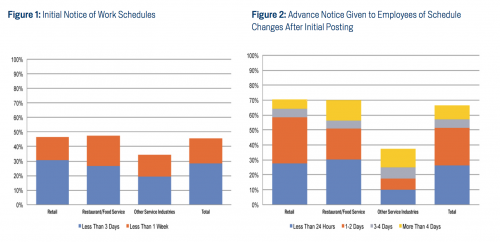Many employees in DC’s service sectors have jobs with unpredictable work schedules that do not provide enough hours or pay to make ends meet, a new study finds. Irregular work schedules make it hard to budget, arrange childcare, pursue education, or hold down a second job to increase their income. It is bad for workers’but also for our communities’when parents cannot plan to be there for their kids, workers cannot get the education needed to improve employment opportunities, and families cannot consistently pay the bills.
The report, “Unpredictable, Unsustainable: The Impact of Employers’ Scheduling Practices in DC,” by DC Jobs with Justice, the DC Fiscal Policy Institute, and the Georgetown University Kalmanovitz Initiative for Labor and the Working Poor, surveys 436 nonsupervisory hourly employees to examine the scheduling practices experienced by DC’s service sector workers.
The survey found that many service-sector retail and food service companies use “just-in-time” scheduling, where employee schedules are changed frequently in an attempt to match customer foot traffic, reservations, or sales volumes. This creates many problems for workers:
- employees receive schedules just days or even hours before they are expected to work;
- schedules can change after they are set;
- shifts can be cancelled at the last minute; and
- employees are often required to work “call-in” or “on-call” shifts, preventing them from making other plans, but also not guaranteeing they will work any paid hours.
The survey finds that:
- Part-time hours are common: The typical employee worked 32 hours per week’at a typical wage of just $10 an hour’and most wanted more hours. This equates to an annual income of less than $17,000.
- Significant fluctuation in work hours: In a given month, the typical employee’s weekly schedule fluctuates by 13 hours’a low of 25 hours some weeks to a high of 38 in others.
- Being available for work but not necessarily getting hours: Some 60 percent of respondents said they must always be available to work to get more hours and/or the best shifts. And half of the time workers were required to be on call, they didn’t end up being asked to work.
- Retaliation for seeking better schedules: Many employees’especially women’reported employer retaliation if they request an alternative schedule or limit their availability. Retaliation includes assignment of fewer hours or less desirable shifts, or even being threatened with job loss.
 In adopting just-in time scheduling practices, employers are essentially passing on business risks to their employees, but none of the associated rewards. Employees must hold time each week for the possibility of work with no guarantee’and without compensation. Meanwhile, employers dodge the cost of regularly staffing their stores during non-peak times.
In adopting just-in time scheduling practices, employers are essentially passing on business risks to their employees, but none of the associated rewards. Employees must hold time each week for the possibility of work with no guarantee’and without compensation. Meanwhile, employers dodge the cost of regularly staffing their stores during non-peak times.
DC policymakers can take common-sense actions that will help workers gain access to fair, predictable schedules, including adopting new standards to give workers sufficient advance notice of their schedules, encouraging stable work schedules in place of just-in-time practices, and protecting part-time employees from being discriminated against with regard to pay, leave, and promotion opportunities.
To read the full report, click here. For the Executive Summary, click here.
To print a copy of today’s blog, click here.
